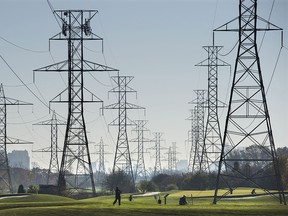Soaring hydro costs could force businesses to flee Ontario, chamber warns
Windsor and other Ontario municipalities could suffer an exodus of businesses unless the province addresses soaring electricity costs, a senior official with the Ontario Chamber of Commerce warned Thursday.

Article content
Windsor and other Ontario municipalities could suffer an exodus of businesses unless the province addresses soaring electricity costs, a senior official with the Ontario Chamber of Commerce warned Thursday.
“They’re telling us the impact of rising electricity rates is real, and it’s compromising their ability to be competitive,” said Karl Bauldauf, vice-president of policy and government relations at the chamber. “Especially with Windsor being a border community, it’s easy for businesses to go over and expand in Michigan, in Ohio, if they can’t meet existing electricity rates.”
Bauldauf issued his warning after a meeting with representatives from the greenhouse industry, Enwin Utilities as well as local companies, such as FCA Canada and Bonduelle Canada.
The meeting, hosted by the Windsor-Essex Regional Chamber of Commerce, was designed to inform local businesses about current electricity savings programs. The businesses heard from Sean Brady, director, business development, at the Independent Electricity System Operator, who outlined programs and incentives designed to lower electricity usage.

“It’s the N0. 1 issue our business community faces,” said Matt Marchand, president and CEO of the local chamber. “We’ve wanted to talk about ideas to get power costs down.”
Since the Ontario government released its 2013 Long Term Energy Plan, industrial electricity rates have increased by 16 per cent, and will increase a further 13 per cent over the next five years, according to a chamber study
. “At the same time, the government is moving ahead with initiatives that will directly affect business, including increases to the minimum wage and Workplace Safety and Insurance Board (WSIB) premiums and a cap-and-trade system,” said Bauldauf.
John Wladarski, vice-president of asset management at Enwin, said some of the meeting participants were skeptical of the programs’ effectiveness on their bottom line. “I’ve heard some skepticism about what opportunities are afforded them, what difference will it will make, if the cost of electricity continued to rise.”

Justine Taylor, energy and environment co-ordinator at the Ontario Greenhouse Vegetable Growers, said electricity makes up about a third of her members’ costs.
“In order for our sector to grow in Ontario, we have to access competitive electricity rates,” said Taylor. “In order for those (electricity savings) programs to be more effective, we are going to have to see some changes in policy.”
Taylor said growers are being wooed by competing jurisdictions in the U.S., dangling generous incentives. “Growers also seeing very attractive incentive programs and packages from competing jurisdiction,” she said. “In Ontario, we just can’t match them, and electricity pricing is part of that package.”
Earlier this year, Leamington-based Nature Fresh Farms credited tax incentives and cheaper utility rates with its decision to build a $200 million greenhouse facility in Delta, Ohio.
Bauldauf said a recent chamber study
showed that 38 per cent of businesses in the province will see their bottom line shrink as a result of rising electricity rates.
“Electricity prices are cited as the top barrier to competitiveness, more than any other issue, including red tape, taxes, and infrastructure, he said.





